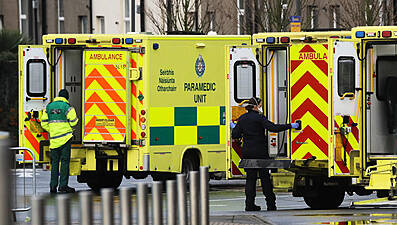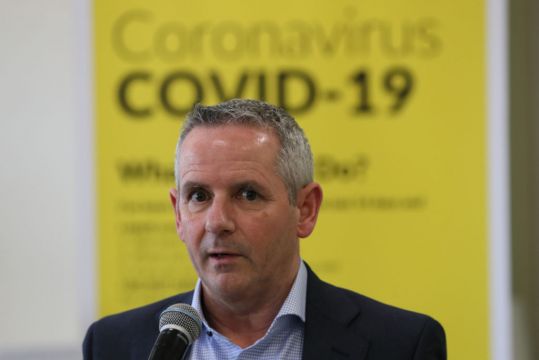The growth of the Delta variant of Covid-19 is likely to “outmatch” the supply of vaccines over the coming weeks, the chief executive of the HSE has said.
Paul Reid told a briefing on Thursday that the health service was facing into the challenge of the variant “from a high base”.
Mr Reid said he wished there was more time, and more supplies, to enable the health service to stay ahead of the increase in cases.
The HSE was planning for an anticipated rise in cases by looking at a range of scenarios, assessing trigger points as infections grow and looking at the experience of other countries, he said.
On Thursday evening, a further 534 cases of Covid-19 were confirmed in the Republic with 627 in Northern Ireland — bringing the total on the island to more than 1,000 in a 24-hour period.
'A very real race'
Mr Reid urged the public to treat the variant threat with “real caution”, particularly those who have not yet been vaccinated or who are only partially vaccinated.
“There’s no doubt we’re actually in a very real race to get the vaccines out ahead of the potential increase in the spread of Delta,” he said.
“We’re closing the gap every day, with more and more vaccines being administered. We should take good confidence and assurance from that.
“But the most likely scenario is that the pace of growth of the Delta variant will most likely outmatch our supply of vaccines over the coming weeks.”
He added: “Our supply lines for the next while do dip down through July, and there’s no doubt that the cases of the variant will increase.
“My main point is the caseloads will increase. We’ll keep vaccinating people and are closing the gap, but there will be rising cases, rising variants, rising Delta cases, potentially rising hospitalisations.
“So we won’t have people vaccinated, there’s a gap there, there’s an exposure there, and people need to treat it with real caution.”
Risk to vaccinated
The briefing heard that if the daily case count gets high enough, it could also pose a risk to vaccinated people.
“We also know that variants spread prominently amongst those who are not fully vaccinated,” Mr Reid said. “A proportion of those who may be fully vaccinated can also come under threat.”
HSE chief clinical officer Dr Colm Henry said that while the vaccination programme has weakened the link between case numbers and hospitalisations, “it isn’t broken”.
“That floodwall is breachable. If there’s enough cases, there’ll be enough vaccine breakthroughs in fully vaccinated people,” he said.
“If there’s enough cases, those who are unvaccinated will get the greater numbers of those cases. Even low vulnerable groups will get Covid-19 and eventually some of those will become ill.
“That’s what we’re seeing in hospitalisations in the UK. In Scotland, for example, over a five-week period, hospitalisations went up from nine per day to 35 per day.
“To be hospitalised you have to be fairly sick. ICU is steady at the moment but we were used to seeing that lag time in our own experience, between the rise in cases, then to hospitalisation, and then to ICU and deaths.”
Straight with the public
Mr Reid said the number of cases of the Delta variant is likely to peak in August. “We know we won’t have all of the adult population vaccinated by then,” he added.
“In essence, the cases are rising before we have caught and vaccinated this significant element of the adult population.”
“That’s why we’re really being straight with the public. The next few weeks is an exposure, because we won’t have everybody vaccinated, and we will see rising cases, so it’s to be really careful.”
The vaccine programme is currently open to people in their 30s, but it is likely to take four weeks for that cohort to receive their first doses, the briefing heard.
People in their 20s are likely to receive their first dose in August and their second dose in September.
People who are fully vaccinated who become a close contact of a positive case will no longer have to self-isolate, provided they are not showing symptoms.
However, a fully vaccinated person who becomes a close contact and has Covid-19 symptoms must self-isolate, the HSE said.
There are roughly 100,000 people in the 60s age cohort who are yet to be vaccinated, but they should receive their jabs by the end of next week.
ICU beds

Mr Reid said areas recording a high incidence of Covid-19 include Donegal, with a 14-day incidence of 342 per 100,000 people, Waterford with a rate of 226 and Sligo with a rate of 215.
Over two million people are now fully vaccinated, he said, and 4.55 million doses have been administered. Seventy per cent of the adult population is now fully vaccinated.
The number of patients in hospitals has increased from 39 two weeks ago, to 46 last week to 59 at present. However, ICU numbers, currently at 17, are staying low and stable.
At the weekend, Mr Reid said 260 of the country’s 300 intensive care beds were occupied — by both Covid and non-Covid patients — leaving just 40 available ahead of a projected surge of the Delta variant.







